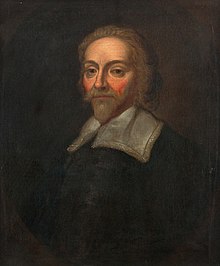John Cameron (theologian)
| John Cameron | |
|---|---|
 |
|
| Born | 1579 Glasgow |
| Died | 1625 |
| Nationality | Scottish |
| Occupation | theologian |
John Cameron (c. 1579 – 1625) was a Scottish theologian.
Cameron was born at Glasgow and received his early education in his native city. After having taught Greek in the university for twelve months, he removed to Bordeaux, where he was soon appointed a regent in the college of Bergerac. He did not remain long at Bordeaux, but accepted the offer of a chair of philosophy at the Academy of Sedan, where he passed two years. He then returned to Bordeaux, and in the beginning of 1604 he was nominated one of the students of divinity who were maintained, at the expense of the church, and who for the period of four years were at liberty to prosecute their studies in any Protestant seminary. During this period he acted as tutor to the two sons of the chancellor of Navarre. They spent one year at Paris, and two at Geneva, whence they removed to Heidelberg. In this university, on 4 April 1608, he gave a public proof of his ability by maintaining a series of theses, De triplici Dei cum Homine Foedere, which were printed among his works. The same year he was recalled to Bordeaux, where he was appointed the colleague of Dr Gilbert Primrose; and when Francis Gomarus was removed to Leiden, Cameron, in 1618, was appointed professor of divinity at the Academy of Saumur, the principal seminary of the French Protestants.
In 1620, the progress of the civil troubles in France obliged Cameron to seek refuge for himself and family in England. For a short time, he read private lectures on divinity in London; and in 1622 the king appointed him principal of the University of Glasgow in the room of Robert Boyd, who had been removed from his office in consequence of his adherence to Presbyterianism. Cameron was cordially disliked for his adherence to the doctrine of passive obedience. He resigned his office in less than a year.
...
Wikipedia
